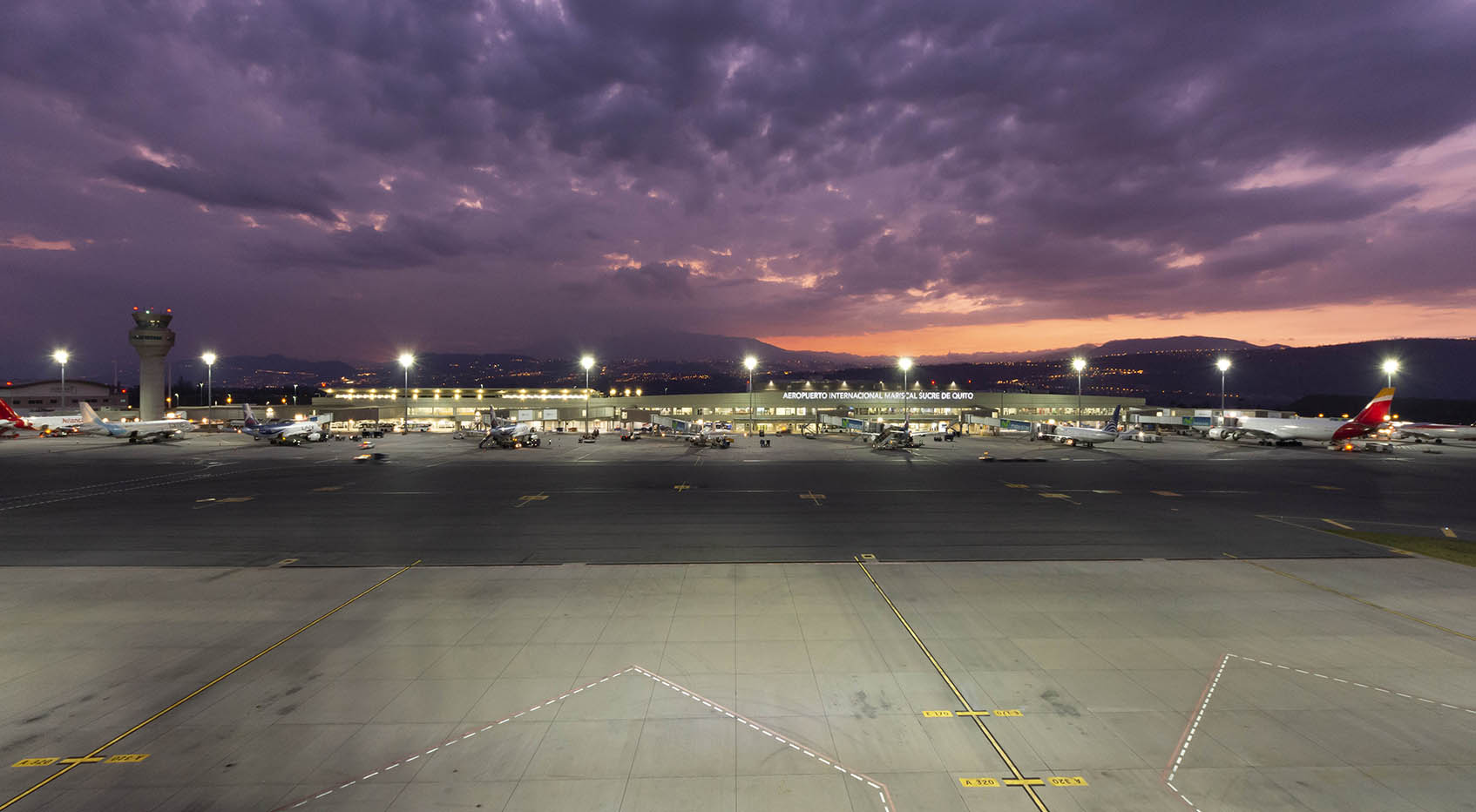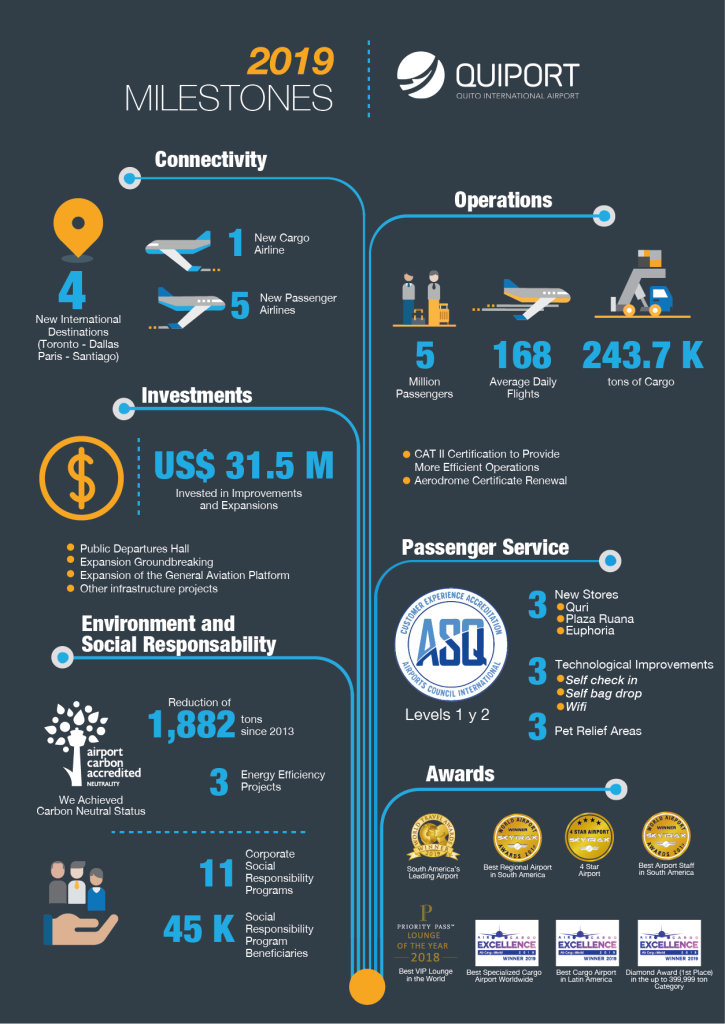2019, A RECORD YEAR FOR CONNECTIVITY AND ENHANCED SERVICES AT QUITO MARISCAL SUCRE AIRPORT

- Increased connectivity with the world, launch of new routes and new domestic and international airlines.
- Expansion of the passenger terminal building with a US$ 60 million investment.
- Continued enhancement of user services and execution of social and environmental responsibility projec
Corporación Quiport’s performance in 2019 has had positive results across all areas of work by the company in charge of Quito International Airport. Below we set out our biggest achievements in 2019.
Connectivity
In 2019 four new international airlines were added to Quito Airport’s list of carriers: Air France, Plus Ultra, Air Canada and Interjet, as well as one domestic airline: Aeroregional. We also expanded international routes with the addition of Toronto, Dallas, Paris and Santiago, and domestically we increased flights to Guayaquil, Cuenca, Manta, Coca and Santa Rosa. Quiport works together with the national government and the Municipality of Quito on a route development strategy to promote connectivity in Quito, presenting it as an attractive destination for tourism and business. There is increasing interest from airlines in Quito and Ecuador thanks to tourism campaigns and an open skies policy which demonstrate the country’s willingness to welcome new airlines.
Cargo
In 2019, for the second consecutive year, cargo operations at Quito International Airport were awarded in the Air Cargo Excellence Awards (ACE) the Diamond Award (first place) in the category of airports up to 399,999 tons of cargo per year, Top Cargo Airport in Latin America and top airport for Specialty Cargo worldwide. This is topped off by a new record for cargo for the Valentine’s Day season, with more than 18,000 tons exported.
Infrastructure
Works began on the redesign of the public departures hall and expansion of the passenger terminal building, the results of which will no doubt provide a positive experience to users.
The works in the public hall, which began in July, aim to enhance the comfort of passengers by optimizing spaces and the flow in the airport. The space will be given a new design to celebrate the context of the airport and the city: a warm natural land full of life with a unique culture and friendly people. An investment of US$ 21 million has been made in the redesign of the departures and arrivals hall, which will be delivered in 2020.
On November 18, 2019, works began to expand the passenger terminal building. With an investment of US$ 60 million,this building will have an area of 16,000 m2. Once the works are completed the terminal will see a 35% increase in areas such as the departure lounges, public departures and arrivals hall, immigration area, customs, and baggage reclaim area.
The space will have a highly functional design and decor to highlight the airport’s identification with the city and its surroundings. This will be achieved with materials and colors such as blue tones in the carpets to recreate the skies of Quito, wood, granite and green spaces.
Passenger Service
To provide a positive experience to users and passengers, new water bottle refill and drinking fountains in the departure lounges and the departures and arrivals hall. This aims to reduce the use of plastic bottles. The water fountains provide 100% purified water. Additionally, we have renovated and increased the number of self-service check-in kiosks which also allow passengers to print labels for checked baggage.
The Domestic VIP Lounge was refurbished with modern decor and designed to enhance the comfort of passengers and increase capacity. The International VIP Lounge was the Global Winner of the Priority Pass Lounge of the Year Awards.
Passengers who travel with pets have the convenience of pet relief areas equipped with hydro-sanitary systems, artificial turf, disposable bags and trash cans. These areas are found in the domestic and international departure lounges and the sidewalk by domestic arrivals.
Social and Environmental Responsibility
It is essential to carry out the airport’s activities within a sustainable, environmentally friendly framework which is responsible towards the community. For this reason, 11 social responsibility programs are carried out for the benefit of more than 45,000 people.
In 2015, the airport joined the Airport Carbon Accreditation (ACA) Program and in 2019 it completed the four stages of the program with concrete actions to reduce greenhouse gas emissions, save fuel, increase energy efficiency and appropriate water use, and protect conservation areas for flora and fauna. The result: Mariscal Sucre Airport became the first international airport in Latin America to obtain carbon neutral status. Also, in 2019 the airport subscribed to the United Nations Global Compact.
Awards
Quiport’s work at Quito International Airport has been recognized by an array of industry stakeholders. In March, Skytrax awarded the airport the Best Regional Airport in South America for the fourth time and Best Airport Staff in South America for the third time as well as renewing its Four-Star Airport status. For the sixth consecutive year, the airport was named South America’s Leading Airport at the World Travel Awards and was ranked 12th in the best airport rankings worldwide by AirHelp, an international organization which advocates for air passenger rights around the world.
The airport’s cargo terminal was awarded the top Diamond status in the category of 399,999 tonnes of cargo per year, as well as the Top Airport in Latin America and Top Airport – Speciality Cargo by Air Cargo Excellence.
In short, 2019 was a highly positive year for airport development in Quito. The results reflect the joint work with the national government, Municipality of Quito and the airport community to increase efforts and find opportunities for improvement to contribute to the progress of the city and country.

